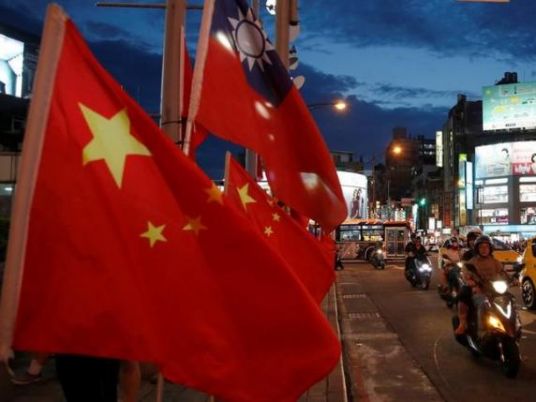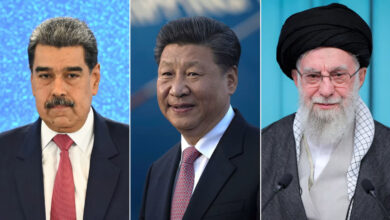
The United States plans to sell Taiwan $1.42 billion in arms, the first such sale under the administration of Donald Trump and a move sure to anger China, whose help the president has been seeking to rein in North Korea.
U.S. State Department spokeswoman Heather Nauert told reporters the administration had told Congress of the seven proposed sales on Thursday.
“It’s now valued about $1.42 billion,” she said.
The State Department said the package included technical support for early warning radar, high speed anti-radiation missiles, torpedoes and missile components.
Nauert said the sales showed U.S. “support for Taiwan’s ability to maintain a sufficient self-defense capability,” but there was no change to the United States’ long-standing “one China” policy, which recognizes Beijing and not Taipei.
The United States is the sole arms supplier to Taiwan, which China deems its own and has never renounced the use of force to bring the self-ruled island under its control.
Beijing has given Taiwan President Tsai Ing-wen the cold shoulder since she took power last year because she leads an independence-leaning ruling party and refuses to recognize the “one China” policy.
On Friday, Tsai’s office said that her government will continue “to seek constructive dialogue with Beijing, and promote positive developments in cross-strait relations.”
“(The arms sale) increases Taiwan’s confidence and ability to maintain the status quo of peace and stability across the Taiwan Strait,” Tsai’s office tweeted.
Asked about the sale at an event on Thursday evening in Washington, China’s Ambassador Cui Tiankai said the United States was “incorrigible” when it comes to Taiwan, the official party paper the People’s Daily reported on its website.
“But we should still continue to instruct (them) and continue advancing on the right track of China-U.S. relations because this is what truly fits with for both countries’ long term interests,” the paper quoted Cui as saying.
The sale, which requires congressional approval, would be the first to Taiwan under Trump and the first since a $1.83 billion sale that former President Barack Obama announced in December 2015, to China’s dismay.
The previous package included two navy frigates in addition to anti-tank missiles and amphibious attack vehicles.
A State Department official said the latest package primarily represented “upgrades to existing defense capabilities aimed at converting current legacy systems from analog to digital.”
Taiwan’s defense ministry said the items would enhance air and sea combat capability and early warning defenses. It said Taiwan and the United States would continue to consolidate their security partnership to contribute to long-term stability in the region.
STRONG SUPPORT
In a strong sign of congressional support, the Republican chairman of the House Foreign Affairs Committee welcomed what he called the “long-overdue” arms sale.
“Sales of defensive weapons, based on Taiwan’s needs, are a key provision of our commitments as laid out by the Taiwan Relations Act and the Six Assurances,” said Rep. Ed Royce, referring to legislation and informal guidelines that steer U.S. relations with Taiwan.
U.S. officials said in March the administration was crafting a big arms sale to Taiwan, but such talk died down as Trump sought to persuade Beijing to do more to rein in North Korea’s nuclear and missile programs, an increasing threat to the United States.
Earlier on Thursday, China responded angrily and said it had protested to Washington after a U.S. Senate committee approved a bill calling for the resumption of port visits to Taiwan by the U.S. Navy for the first time since the United States adopted a one-China policy in 1979.
The bill also directs the Pentagon to help Taiwan develop an indigenous undersea warfare program and recommends strengthened strategic cooperation with Taipei.
China’s Foreign Ministry spokesman said the bill was in violation of the principles of U.S.-China relations and called on Washington to halt military drills with and arms sales to Taiwan “to avoid further impairing broadly cooperative China-U.S. relations.”
U.S. officials told Reuters this week that Trump – who alarmed Beijing after assuming office by breaking with decades of precedent and talking to Taiwan’s president – was becoming increasingly frustrated with China over its inaction on North Korea and trade.
According to the officials, Trump is now considering trade actions against Beijing, despite having heaped praise on Chinese President Xi Jinping after an April summit.
Also on Thursday, Washington stepped up pressure on Beijing by imposing sanctions on two Chinese citizens and a shipping company for helping North Korea’s nuclear and missile programs and accusing a Chinese bank of laundering money for Pyongyang.
Trump plans to meet Xi again on the sidelines of the G20 summit in Germany next week, U.S. National Security Adviser H.R. McMaster told reporters
Reporting by Arshad Mohammed, David Brunnstrom and Yeganeh Torbati; Additional reporting by J.R. Wu in TAIPEI and Christian Shepherd in BEIJING; Editing by Richard Chang, Jonathan Oatis, Paul Tait and Michael Perry; Reuters




